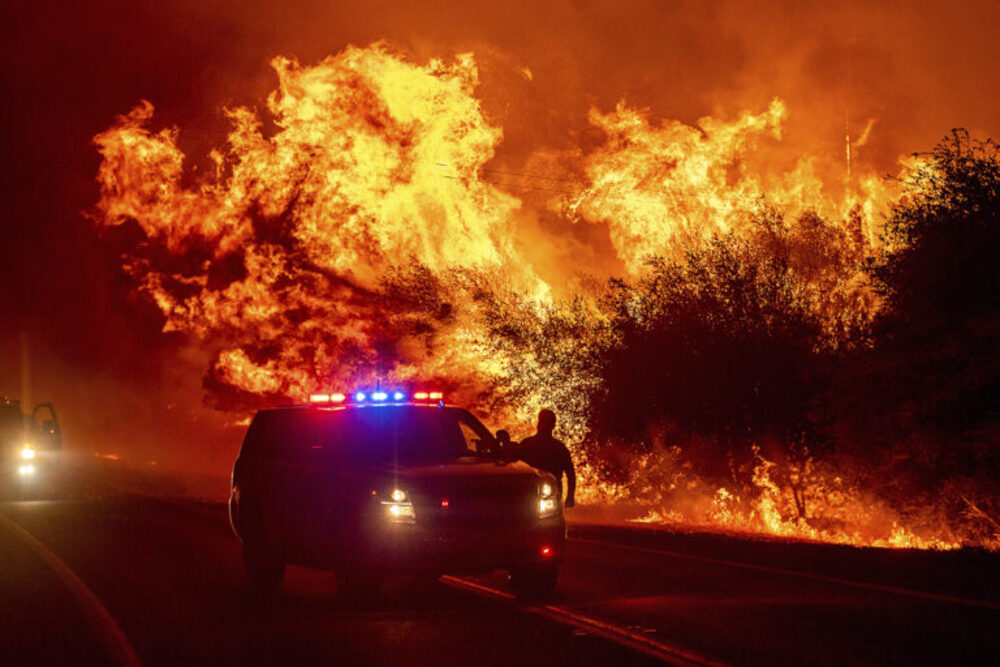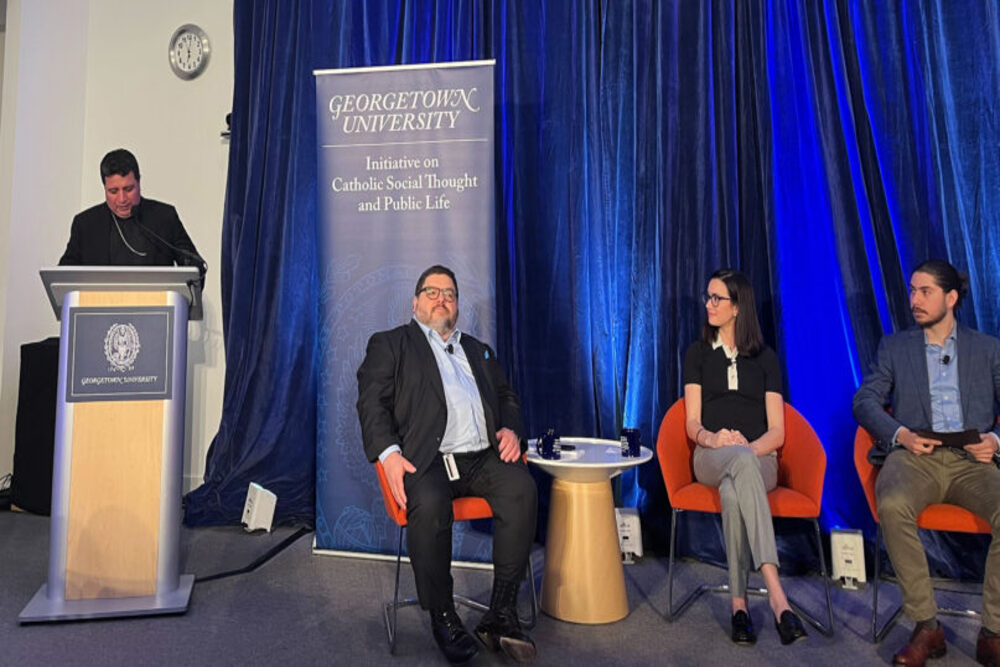
Flames lick above emergency vehicles on Highway 162 as the Bear Fire burns in Oroville, California, Sept. 9, 2020. (AP/Noah Berger)
Latinos are uniquely positioned to take action on environmental causes due to the hazards they face and their commitment to the issue, said experts at a Wednesday (May 22) panel hosted by Georgetown University.
"What makes our community become environmentalists," said Elena Gaona, communications director for the Chispa (Spanish for “Spark”) branch of the League of Conservation Voters, "is more urgent and more connected to the life and death of their children and of themselves and of their neighbors."
"While climate change is here, it has been here longer and felt more deeply by communities that are Latino in the U.S.," she said.
Mark Hugo Lopez, the director of race and ethnicity research for Pew Research Center, said that Latinos report being more impacted by environmental issues and more concerned about climate change than the general U.S. population. "Latinos are poised to be leaders in their communities and nationally on environmental issues," he said.
"Three-quarters of Latinos who are religiously active tell us that they hear about climate activism in their sermons where they go to church," Lopez said. In comparison, 44% of white religious attenders and 55% of Black religious attenders said they hear about climate change in sermons.
Gaona and Lopez were speaking at a Latino Leader Gathering sponsored by Georgetown’s Initiative on Catholic Social Thought and Public Life. They were joined by Washington Auxiliary Bishop Evelio Menjivar; Yakima, Washington, Bishop Joseph Tyson; and Silvia Foster-Frau, a Pulitzer Prize-winning national investigative reporter at The Washington Post.

Georgetown University hosted a Latino Leader Gathering Wednesday, May 22, 2024, in Washington. (RNS/Aleja Hertzler-McCain)
The name of the panel included the "Cry of the Earth and the Cry of the Poor," a reference to Brazilian liberation theologian Leonardo Boff’s 1997 book, which Pope Francis also referenced in his 2015 environmental encyclical Laudato Si’.
Francis “appeals for a new awareness and dialogue about how we are shaping the future of our planet,” Menjivar said to open the panel. “A true ecology approach always becomes a social approach,” the bishop said.
Tyson, who is the episcopal liaison for Catholic Climate Covenant, said that, in his diocese, he practices Francis’ teachings by emphasizing physical accompaniment.
"I require the seminarians to pick fruit in the summer because if you want to elevate the bread and wine, the gift of the earth and the work of human hands, I want my men who are future priests to know the labor that goes in to put the cherries into the basket," said Tyson, whose diocese is highly agricultural and has a largely Latino population.
Gaona said that, growing up, in her Catholic religious education, she learned that the commandment against killing extended to "the ability to kill people’s spirit and soul," a teaching that informs how she lives her faith in her advocacy work.
"Three-quarters of Latino adults say that their communities are impacted at least some by environmental issues," Lopez said, explaining that immigrant Latinos, younger Latinos and Democrat Latinos were all more likely to report being impacted. Latinos are also more likely than the general public to say that climate change is caused by human activity, Lopez said.
Advertisement
Foster-Frau shared several examples from her reporting of Latinos facing barriers to civic engagement, from conducting government business in English to at-large elections. However, she also found Latinos effectively organizing for better environmental conditions.
In Sunland Park, New Mexico, she recalled how older Latinos who remembered a previous fight to remove an incinerator from over their water source were now leading their community to draw attention to elevated levels of arsenic in their water.
"The power of community can really make change in ways that nobody expects," Foster-Frau said.
Tyson highlighted the role of the church in providing a space for undocumented Latinos to participate in civic engagement.
"In many ways, the diocese and our ministry is really active, and our Masses are jammed in Spanish, because the social, the political, the spiritual, the agricultural, the communal, all are on the church and around the pastor, partly because there’s no other forum if you’re undocumented," he said.
"When you walk into a church, and you’re undocumented," Tyson explained, "you think to yourself, I’m not alone. We are many."








